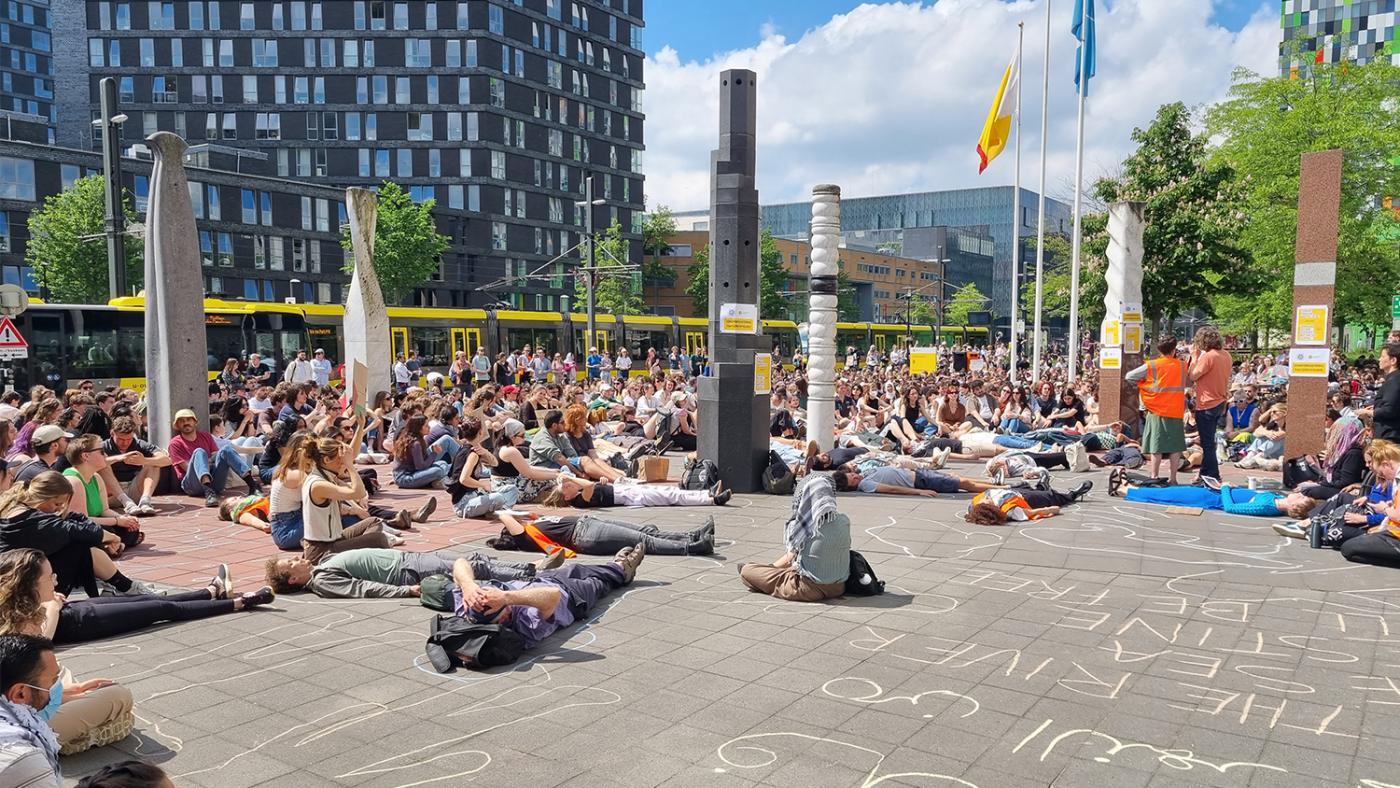The 'last' protest of this academic year
UU students and staff protest for Palestine again this Tuesday

Assistant professor Markha Valenta sent out a press release on behalf of UU Staff for Palestine, calling Tuesday the "last" march of the academic year. The group will take the summer to prepare for the actions they will take next academic year.
The march is being held to reinforce four demands addressed to the Executive Board, such as speaking out against Israel's attacks in Gaza, which violate international law and the human rights of Palestinians. In their view, UU must also be transparent about its institutional ties with Israeli universities, organisations and companies that contribute to violence and discrimination against Palestinians, and break them. Finally, UU must support academic organisations in Palestine that are anti-colonial and solitary.
Although it has already published a website listing its partnerships with universities, organisations and companies in Israel, UU wants to announce this summer which ones will be severed. Partnerships that do not fit ethical guidelines for collaboration, such as research that contributes to the weapons industry, will be terminated. However, according to Valenta, it is not about research itself, but rather about the attitude of institutions that do not condemn human rights violations. “So far, not a single Israeli university has spoken out against attacks in Gaza, which is genocidal military violence.”
According to Valenta, today's demonstration is necessary because the Executive Board is avoiding a public debate. “There is a considerable group of employees and students who need such a debate. A conversation with just a few people is not enough.”
Debate
Following the walk-out and the demonstration of May 13, the Executive Board agreed to such a debate. “We had already decided who we could ask to be the moderator. In consultation with this moderator, we would make agreements about the rules, such as how to ask questions. However, when we were organising this debate, the rectors of all universities published an op-ed in the Trouw newspaper. After that, the Executive Board said it didn't want to participate in an open debate anymore because it didn't feel safe. Instead, they preferred to meet a few people in a small room. In addition, the Executive Board wanted to stream the conversation live, without mentioning who would be the online moderator and how the audience would be involved. They also wanted to do it very quickly, so much so we didn't have time to talk to the moderator or inform our supporters. In short, the proposal was unworkable.”
According to Valenta, it has become even more difficult to have an open conversation with the board now that the university has already stated publicly that it will not boycott Israel. “People are a bit angry, of course. And I can imagine that the Executive Board does not like having an angry group in front of them. In addition, the room for discussion and negotiation has become smaller. By saying that they do not want to cut ties, the stalemate has increased and the chance of an open dialogue has decreased. This also strengthens our desire to demonstrate. After all, a conversation does not solve anything.”
Protests will go on
The students of the action group Utrecht in Solidarity with Palestine have already said that they will continue to demonstrate and take action until all ties with Israeli institutions are severed. According to anonymous activists in a WhatsApp group called Activism Announcements, today's march will not be the last demonstration of this academic year, as the press release reports. Activists report in the app: “We will continue to make our voices heard all summer. The Student Intifada doesn't follow UU's calendar”.
Valenta thinks that employees will keep going to the demonstrations too. “We have raised significant awareness, Palestine is on the international agenda. The movement has become more massive in recent months. The protest is now intense, visible and loud. I think the demonstrations will continue until Western countries call Israel out for violating human rights, ceasing to treat it as an exception.”
She also estimates protests to continue at UU as long as international law and human rights are an important research theme at UU and Open Societies, which have democracy, equality, independence and global justice as their starting point, continues to exist.
Still a debate
The Executive Board acknowledges that it promised protesters a debate during the walk-out on May 13. However, the university says that it has always said this would be a small delegation. After all, board members have recently learned how difficult it is to have a substantive conversation with a large group, especially about an emotional subject like this. The university says it has proposed to conduct this debate with a small delegation that could be followed via livestream. Spectators could also ask questions online. The proposed dates were indeed at short notice because the action group wants such a dialogue before the summer holidays. “However, UU Scholars and Staff for Palestine have consistently returned the requests to the desired number of attendees of 200 people.”
The board has now decided to organise a debate after all. There will be an online panel with students and employees talking about the ethical issues surrounding academic collaborations, how the university can deal with feelings of insecurity resulting from the protests, and how Dutch universities can contribute to the academic community in Gaza. The university states that its invitation towards UU Scholars and Staff for Palestine to join the conversation still stands. The date has not yet been announced.